
The REEJER, Apprentis d’Auteuil and the FAAI advocate at the UN for the most vulnerable children in the Democratic Republic of the Congo
Last week, two representatives of the REEJER (Réseau des Educateurs des Enfants et Jeunes de la Rue) came to Geneva for the Universal Periodic Review (UPR) pre-session of Democratic Republic of the Congo (DRC) in order to convey the voice of the most vulnerable children and young people of Kinshasa.
The UPR pre-sessions aim at providing civil society organizations with a strategic advocacy platform to address the human rights issues affecting their country. The pre-sessions bring civil society organizations, national human rights institutions and recommending states together in order to influence the recommendations that will be made to the State under review at the subsequent UPR session, the following month.
It was within this framework that Ms. Marguerite Djokaba, Project Manager at the REEJER, addressed nearly 40 diplomatic missions at the United Nations Palais des Nations on Tuesday, April 2. In her statement, she first introduced the current context of child protection in the DRC, and subsequently presented our 4 recommendations for the protection of children's rights in the DRC.
First, in order to address the lack of continuous monitoring of the respect and implementation of children’s rights in the DRC, we recommended to ensure the effective implementation of the Law NO 09/001 of January 10, 2009 on the protection of children, in particular by ensuring the immediate signature of the decree on the organization and functioning of the National Council for Children and its implementation, in accordance with the spirit of the above-mentioned law.
Second, considering that children accused of witchcraft are the victims of extreme violence, marginalization and abandonment, we suggested that the Congolese State runs a nationwide awareness campaign on the phenomenon of children accused of witchcraft, targeting the mainstream public and the Evangelic churches, and ensure that the religious leaders responsible for such offences against children are punished by law.
Last, to address the lack of access to education and health for the most vulnerable children as well as the growing phenomenon of prostitution of young girls living on the streets and their exposure to sexual violence, STDs and unwanted pregnancies, we submitted two additional recommendations to the Congolese government. On the one hand, we asked the State to guarantee unconditional access to the so-called “certificate of indigence” for the most vulnerable children, in particular children living in the street, which allows them free access to education and health. On the other hand, we asked for the implementation of specific measures meant at reducing health risks associated with early pregnancy, and to ensure the reintegration of young girl-mothers into the education system.
Following the pre-session, and throughout the week, Ms. Djokaba and Mr. Rémy Mafu, Coordinator of the REEJER, held bilateral meetings with influential representatives of 16 diplomatic missions to convince them to take up our recommendations.
Furthermore, Mr. Mafu also spoke on behalf of the REEJER, Apprentis d'Auteuil and the FAAI at a side event organized by the European Union (EU) delegation, and attended by representatives of almost all EU Member States delegations and approximately 20 NGOs. Our recommendations were well received by all the delegations we met, and particularly by those whose priorities include children's rights.
Although international advocacy work may seem abstract to some and lack immediate and significant impact, it is nonetheless fundamental. Indeed,"(...) advocacy work takes time. When you engage in advocacy, it is not to get results overnight. One day, we light the fire and day after day, we maintain it, we keep the same intensity. We keep reminding people of our concerns and one day we obtain the results. (...) We see this UPR opportunity as another hope: although it is not a binding mechanism, it remains a means for us to constantly remind the Congolese State of our demands to improve the situation of children. " (Marguerite Djokaba, REEJER).
The UPR session of the DRC will take place on May, 7 at the UN. The FAAI will be present to monitor the recommendations submitted to the DRC and to ensure instant follow-up with the delegations met who have taken up our recommendations. The DRC will then decide on the acceptance of the recommendations received, at the latest, when adopting the UPR outcome report at the 42nd session of the Human Rights Council in September 2019. This session will be yet another opportunity for civil society to take the floor during this third cycle of the UPR of the DRC and share its own assessment of the review.
Photo information: Representatives of the REEJER and the Fondation Apprentis d'Auteuil in front of the Palais des Nations in Geneva during the UPR pre-session. From left to right: Marguerite Djokaba, Rémy Mafu, Claire-Marie Braguier, Laura Hendricksen / © FAAI